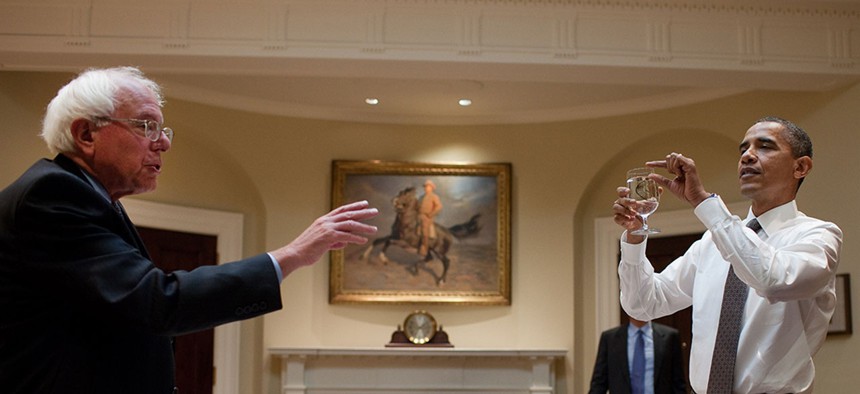
Obama and Sanders joke at a meeting at the White House in 2010. Pete Souza/White House file photo
The Rocky Obama-Sanders Relationship
The president and the runner-up to replace him will meet Thursday with a long, rough history between them.
Don’t expect a lot of warmth when President Obama sits down Thursday at the White House with Sen. Bernie Sanders. This is not a reunion of political allies or personal friends or fellow senators who bonded when they served together. Instead, the agenda will be all business as the president does his duties as leader of the Democratic Party, and Sanders takes the opportunity to lick his wounds, air his grievances, and begin to come to grips with his defeat at the hands of former Secretary of State Hillary Clinton.
Both at the White House and in the Sanders camp, there is too much history for either side to pretend otherwise. Aides to Obama well remember the senator’s loud opposition to the president’s positions on single-payer health reform, Social Security reform, Wall Street regulation, the proper pace to end two wars—even Sanders’s effort to block the president’s appointee to be a commissioner of the Food and Drug Administration because of ties to the pharmaceutical industry.
They remember his lengthy speech on the Senate floor in December 2010 condemning the tax-cut deal between the White House and Republicans. And they especially remember his open talk in 2011 of the need to have a true progressive run against Obama in the Democratic primaries in 2012. “If a progressive Democrat wants to run, I think it would enliven the debate, raise some issues, and people have a right to do that,” he said in March 2011. Four months later, on a radio program, Sanders spoke of the “millions of Americans who are deeply disappointed in the president, who believe that, with regard to Social Security and a number of other issues, he said one thing as a candidate and is doing something very much else as a president, who cannot believe how weak he has been … in negotiating with Republicans.”
They also took note at the White House when the Sanders campaign gave great prominence to one of the most acerbic critics, Ivy League professor Cornel West, who labeled Obama “a Rockefeller Republican in blackface” in a November 2012 interview with Democracy Now and who told Truthdig in May 2011 that Obama was “a black mascot of Wall Street oligarchs and a black puppet of corporate plutocrats.”
When National Journal included a critical comment from Sanders in a story in 2012, then-White House press secretary Jay Carney fired off an angry email to the offending reporter: “You’re quoting Bernie Sanders??? BERNIE SANDERS??” Carney’s message was clear—we don’t take Sanders seriously at the White House and you shouldn’t either in your reporting. It was a message that Carney not so subtly delivered again after he left the White House and was quoted widely as stating that the president favored Clinton in her match against Sanders.
In the Sanders camp, that comment by Carney—and the winking assent of the White House—rankled. But not as much as the comment by the president himself in January. In an interview with Glenn Thrush of Politico, Obama sought to come off as even-handed in assessing the two Democratic candidates. But there was no masking his preference for Clinton when he forcefully challenged the notion that his campaign in 2008 was a model for Sanders in 2016. “No, no,” said Obama, adding, “I don’t think that’s true.”
Obama was at his most dismissive of Sanders in that interview when he voiced sympathy for Clinton’s challenges as a front-runner and said of Sanders, “You’re always looking at the bright, shiny object that people haven’t seen before—that’s a disadvantage to her.”
Nor did relations warm during the campaign. Those around Obama understand that Democrats cannot just promise to provide a third Obama term. But they chafed at some of Sanders’s attempts to break sharply with the president’s record. In a February interview on MSNBC, Sanders suggested that Obama had not displayed sufficient presidential leadership to close the gap between Washington and the American people. Clinton’s spokesman, Brian Fallon, quickly tweeted, “The idea of Bernie Sanders, who has little to show for his 25 years in Congress, giving leadership lectures to President Obama is absurd.”
Earlier in the campaign, Sanders drew the attention of the White House when he said his presidency could represent a “course correction” from the current administration.
Despite the tension just beneath the surface, both sides have publicly celebrated what they call a friendship as the president has officially remained neutral and Sanders has tried to promise more progressive policies without alienating the incumbent. “Barack Obama is a friend of mine,” Sanders said on ABC’s This Week in November. “I think he’s been a very strong president and has taken this country in an extraordinarily difficult moment in history in a very positive way.”
Thursday, at a difficult moment in Sanders’s political career, the two men have a chance to refresh that relationship and test how receptive the senator is to tough advice from his “friend.”







